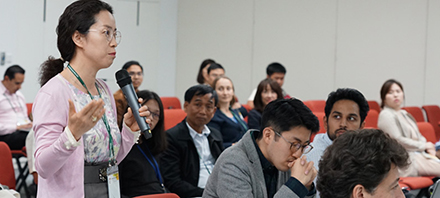
Representatives from tropical timber exporting and importing countries discussed responsible trade in timber at a session during the Asia-Pacific Forestry Week in Korea on 19 June. According to INTERPOL the illegal timber trade is the number one environmental crime in terms of value, up to US$152 billion each year. Source: Timberbiz
But countries on the supply side cannot tackle illegality and promote responsible trade alone this is why the European Union (EU) published and implemented its Forest LawEnforcement, Governance and Trade (FLEGT) Action Plan.
Under this plan, the EU, which is a major timber consumer market, engages with tropical timber exporting countries in bilateral trade agreements to ensure that timber and timber products exported to the EU come from legal sources.
At the same time the EU puts in place measures to stop illegal timber from entering the EU market, and to increase demand for timber from responsibly managed forests.
The session provided an opportunity for collaboration and exchanges between timber producer and consumer countries, as well as among consumer countries.
A panel of representatives from key tropical timber producing and processing countries including China, Indonesia, Thailand and Vietnam explained what they do to improve forest governance, making their forest sectors legal and more sustainable.
“Vietnam is the biggest exporter of forest products in Southeast Asia, exporting to more than 120 countries,” Van Dinh Tuyen of Vietnam’s Forest Protection Department said.
“We have made considerable efforts in recent years to improve our forest sector. This has resulted in a strong decrease in forest law violations and a significant increase in forest cover in our country.”
Kantinan Peawsa-ad, director of Thailand’s Forest Economics Bureau said that Thailand also takes actions to increase the country’s forest cover, including promoting tree planting, increasing protected areas and developing the economic value of forests.
“The FLEGT process with the EU plays an important part in our efforts,” she said. “The multi-stakeholder process is a key element to develop a trade in responsible timber products, and we also learn from the experiences from countries like Indonesia and Vietnam, who are further with their FLEGT processes.”
“It took 10 years to develop our timber legality assurance system and issue FLEGT licences’ said Rufi’ie, director of Forest Products Processing and Marketing at Indonesia’s Ministry of Environment and Forestry.
“And even though we are exporting FLEGT-licensed timber, the journey continues because we continuously evaluate and improve our systems and processes. But the efforts are paying off, exports of verified legal timber have doubled compared to 2013.”
Jing Tao, deputy division director of Foreign Economic Cooperation, Department of Planning and Finance of China’s National Forestry and Grassland Administration said that China is mainly a processing country, but also plays an important role as a producing and consuming country.
The Chinese government is greatly concerned about sustainability and public awareness of environmental issues is growing. China is developing a timber legality verification system, but implementation of the system will have to take a step-wise approach due to the large forest industry in the country.
The first step is promoting the application of timber legality verification among associations and enterprises. The audience asked the panellists questions about the way timber imports are being dealt with in the countries, the role of third-party certification and the data management and IT systems underpinning the national efforts.
A panel of representatives of key markets for timber and timber products including Australia, the EU, Japan, South Korea and the USA explained how their respective legislative frameworks work and how they complement and respond to the actions of the producing countries.
“It is easier for operators to access the EU market with FLEGT-licensed timber, as such timber is deemed to comply with the EU timber regulation,” said Nicholas Burge, head of the Trade and Economic Section, Delegation of the European Union to the Republic of Korea.
“This is a clear example where the efforts made to tackle illegal logging in producing countries are recognised by the EU market.”
Emma Hatcher, director, International Forest Policy of Australia’s Department of Agriculture agreed on the importance of collaboration and highlighted the need to work with the private sector to facilitate trade in legal timber.
“Building capacity along the supply chain has been an effective measure to facilitate legal timber trade’ she said.
“We developed industry toolkits to support due diligence and country specific guidelines to provide importers guidance in their risk assessment.”
“Collaboration with international partners to build capacity and enhance collaboration among enforcement agencies is essential,” said Laurie Dubriel, attorney at the US Department of Justice.
“The US is committed to promote legal timber trade and enforcement under our legislation in form of the Lacey Act is instrumental in changing the behaviour of the industry.”
With so many actors involved in the complex timber supply chains from forest to final products reaching consumers, Rufi’ie, Director of Indonesia’s Forest Products Processing and Marketing summarised it best:“Timber legality only works if both sides, the consumers and producers, promote it.”





